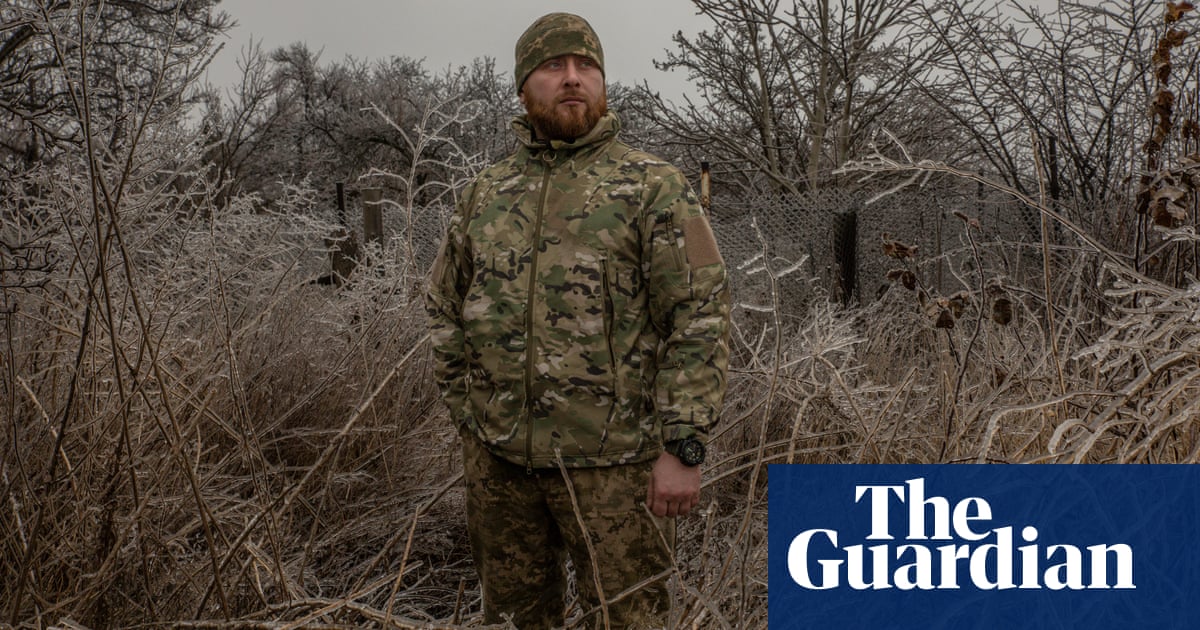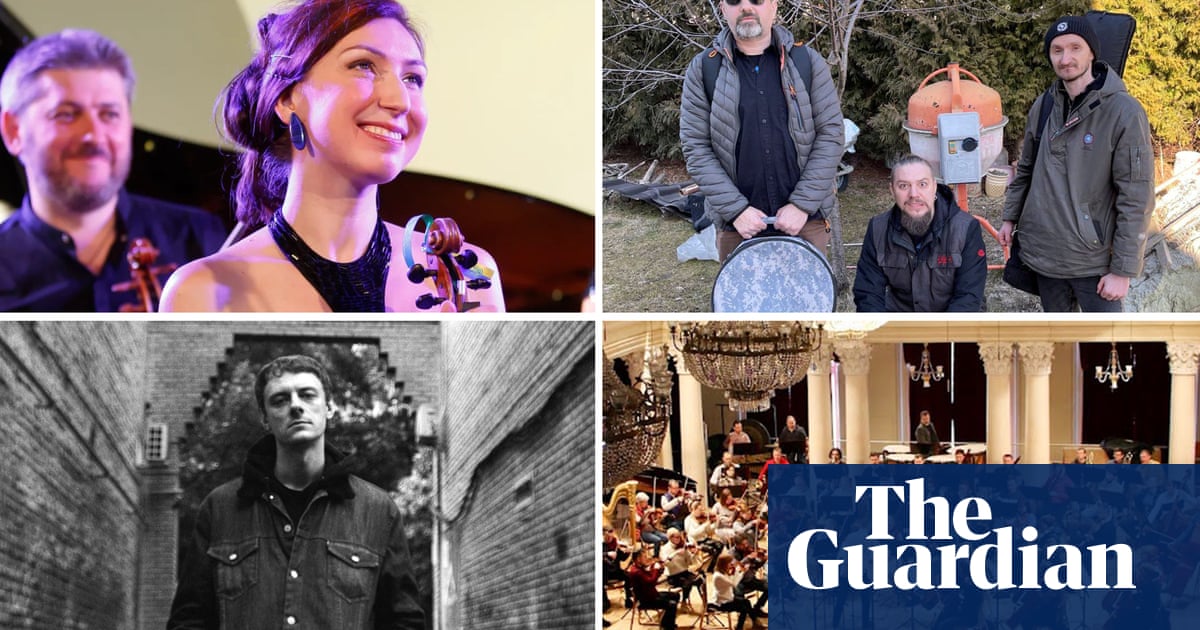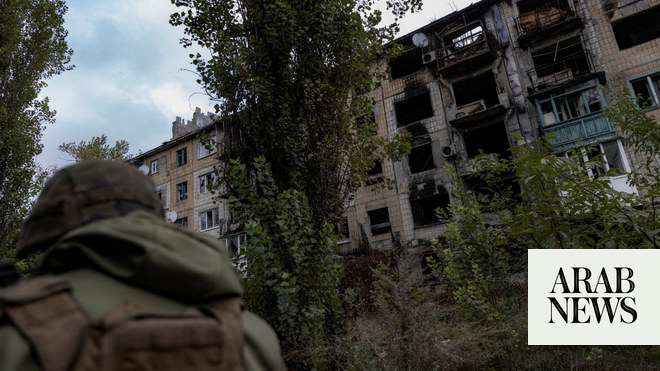
For two months, the Russian army has been trying to seize the eastern Ukrainian city of Avdiivka. First, it launched a massive frontal assault. Dozens of pieces of equipment were destroyed. Then it dispatched armoured columns in different directions. Now, in a third wave, small groups of infantry are being sent to penetrate Ukrainian positions.
“There are dozens of bodies. They try to advance. We kill them. They send more,” said Ivan Smaga, the deputy commander of Ukraine’s 25th storm battalion, which is defending Avdiivka. “To begin with it was groups of 10 men. Now it’s one or two or three without support. Their commander uses them like live meat.”
Smaga said the Russians ordered into battle used ingenious methods to survive. Some crawled over the icy ground. Others dug holes “like mice”. A few pretended to be dead, lying for hours next to the corpses of their fallen comrades. “We watch them. They lie under warm bodies. Eventually they get up move.” Ukrainian drones and artillery picked them off, he said.
The fighting in Adviika and southern and eastern Ukraine continued as EU leaders met in Brussels for talks on Ukrainian membership of the bloc and billions in economic and military support for the country, amid fears in Kyiv over the strength of western backing. Meanwhile in Moscow, Vladimir Putin vowed to press ahead. “There will be peace when we achieve our goals,” he said on Thursday. “They haven’t changed. Denazification of Ukraine, the demilitarisation of Ukraine.”
Avdiivka has been on the frontline for almost a decade. In spring 2014, Russia staged a military takeover of Donetsk, the regional capital, 3 miles to the south-west and a 20-minute drive away. Thereafter, Ukrainian troops faced off against their Russian counterparts in an industrial zone, looking out on to a no man’s land of trees and yellow feather grass. Shells flew in both directions.
In the first weeks of Putin’s full-scale invasion last year, the Russian army swept across much of southern and eastern Ukraine. It was unable to conquer Avdiivka, however, where Ukraine’s armed forces had built extensive fortifications and underground command posts, once visited by western dignitaries. The town is an anomalous bulge, from Moscow’s point of view, surrounded by Russian-controlled territory on three sides.
For now its Ukrainian defenders are holding on. The Russians might be “idiots” but they have “more of everything”, Smaga said. That includes 40,000 troops massed on the Avdiivka salient, tanks, Soviet-era MT-LB armoured fighting vehicles and 152mm howitzers. Since late summer, less ammunition had been reaching his unit, Smaga said. “We have enough to defend from attack. But if they keep coming, we are going to need an awful lot more.”
What happens in Avdiivka has huge symbolic value. For the Kremlin, its capture would boost Putin’s campaign before elections in March, when he is standing for president for a fifth time. Russia’s recent attacks all across the eastern front, including around the town of Bakhmut, appear to be driven by politics and narrative-shaping as much as by military logic. The message: Russia is winning and Ukraine is losing.
For Kyiv, defeat in Avdiivka would add to the sense of swirling gloom, after a failed counteroffensive earlier this year. This week, Volodymyr Zelenskiy scrambled to Washington to plead for more security assistance in the face of opposition from House and Senate Republicans. The western coalition that has been backing Kyiv, supplying weapons and taking in refugees, appears to be slowly unravelling.
Avdiivka, once home to 25,000 people, is a sprawling ruin. Russian warplanes and guns have pulverised residential buildings, hospitals, schools, three supermarkets and all five of its churches. “They fire all the time,” said one resident, Vitalik Santakov. The two main districts, old Avdiivka and an ensemble of Soviet panel houses known as Chemik, have been damaged. For months there has been no electricity, water or gas.
Incredibly, 1,200 people still live in the town. Most are old. “I was the last person left in a five-storey block. I didn’t sleep in the basement because it’s cold and infested with mice,” Santakov said. “My place got bombed. I moved into a neighbour’s flat. The windows were blown out. Then I moved into a third.” He collected firewood and cooked on a potbelly stove. One shop, known as 11, was still open, operating in a half-destroyed building next to a shot-up car, he said.
Last week volunteers evacuated Santakov from Avdiivka. “I’d had enough,” he said. It was a perilous drive out along the town’s only road, used by Ukraine’s military. The Russians monitor it with drones. “We left in a convoy. I saw two explosions just in front of us. We stopped and then raced on,” he said. “You see few civilian vehicles.” He was now living in temporary accommodation for displaced persons in the Donbas town of Pokrovsk, 25 miles from the frontline.
Why did some residents refuse to leave, as bombs fell around them? Tamara Tamakova, an 85-year-old widow evacuated on Tuesday, said she had nowhere to go. “My husband is dead. I have nobody,” she said. Born in Soviet Russia, Tamakova said she had moved to Avdiivka in 1963 to work in an asphalt factory. Lately, she said, she had collected rainwater to cook. With snow and freezing temperatures, she had slept in her clothes under blankets.
As living conditions worsen, the Russians creep forward. Ten days ago they seized Promka, an industrial area on the town’s south-eastern outskirts. In the north-west there is fierce fighting in the village of Stepove. Russian troops have launched a series of raids on Avdiivka’s coke and chemical plant. They have captured a prominent slag heap, raising a Russian tricolour, but they have so far been unable to break through a perimeter fence. Bodies lie around.
“The factory is ours,” said Smaga, the deputy commander. “No Russian soldier has got inside.” The plant, owned by the oligarch Rinat Akhmetov, occupies a vast site. Built 60 years ago, it used to employ 4,000 people. There are blast furnaces and an underground nuclear bunker. The last few civilian workers who kept generators running have left. The Russians are trying to advance along a railway track and a cascade of ponds, where staff used to fish.
Irina Drozach, 59, a former employee, said the factory had long been a target. In 2015 she was injured when the Russians fired three Grads into a workshop. “It was like an earthquake. There were flames and dust,” she said. A machine operator, Drozach said the plant’s activities stopped last year. “It was once a friendly place. Relations were excellent between workers and management. We celebrated each other’s anniversaries and birthday,” she said.
She and her husband, Viktor, a retired police officer, fled Avdiivka in May 2022 when a missile demolished their home. “It was night. We were asleep,” she said. Viktor was wounded in the foot and later had to have three toes removed after he contracted gangrene. What would happen to Avdiivka? “I loved my work and job. It was a wonderful green town. Now it’s a wreck,” she said. “I can’t see it has much of a future.”
Smaga, whose call sign is Mongol, said Ukraine urgently needed air power to chase away Russian fighters dropping 500kg Fab bombs. Western equipment was crucial if his troops were to hold the Russians back, especially heavy artillery. His brigade, the 47th mechanised, used US-supplied Bradley fighting vehicles. “I like them. They terrify the enemy. They are manoeuvrable. When you sit inside you feel yourself protected,” he said.
After nearly two years of all-out war, Ukrainian officers say there have no choice but to carry on fighting. “Putin doesn’t want negotiations. Nor do we,” said one, Yuriy Zubchak. “A lot of our guys have died. They have paid a huge price. If we stop now then for what?” Zubchak said his men were reconciled to a long conflict, defending Ukrainian homes and land. “We are not worried about Russia’s infantry superiority. They are 140 million. What concerns us is they have more weapons,” he said.
How long Avdiivka will remain a Ukrainian town is uncertain. The topic of withdrawal from Avdiivka is not being discussed, at least not publicly. In bitter winter, troops stand in icy trenches, warming themselves with homemade paraffin tins, lit by a candle. There are constant booms. “We will stand until the end,” Smaga said. “If the west won’t support us, Moscow will try to seize Kyiv again like in 2022. And then it will keep going.”












